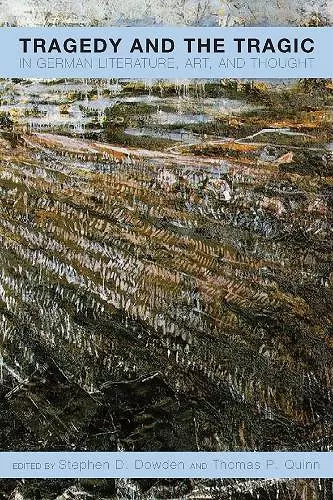Tragedy and the Tragic in German Literature, Art, and Thought
Stephen D Dowden editor Thomas P Quinn editor
Format:Hardback
Publisher:Boydell & Brewer Ltd
Published:29th Dec '14
Currently unavailable, currently targeted to be due back around 11th February 2025, but could change

Essays in this volume seek to clarify the meaning of tragedy and the tragic in its many German contexts, art forms, and disciplines, from literature and philosophy to music, painting, and history. The many catastrophes of German history have often been described as tragic. Consequently, German literature, music, philosophy, painting, and even architecture are rich in tragic connotations. Yet exactly what "tragedy" and "thetragic" may mean requires clarification. The poet creates a certain artful shape and trajectory for raw experience by "putting it into words"; but does putting such experience into words (or paintings or music or any other form) betray suffering by turning it into mere art? Or is it art that first turns mere suffering into tragic experience by revealing and clarifying its deepest dimension? What are we talking about, exactly, when we talk about tragic experience and tragic art, especially in an age in which, according to Hannah Arendt, evil has become banal? Does banality muffle or even annul the tragic? Does tragedy take suffering and transform it into beauty, as Schiller thought?Is it in the interest of truth for suffering to be "beautiful"? Is it possible that poetry, music, and art are important because they in fact create the meaning of suffering? Or is suffering only suffering and not accessible to meaning, tragic or otherwise? This book comprises essays that seek to clarify the meaning of tragedy and the tragic in its many German contexts, art forms, and disciplines, from literature and philosophy to music, painting, and history. Contributors: Jeffrey A. Bernstein, Stephen D. Dowden, Wolfram Ette, Jennifer Anna Gosetti-Ferencei, Barbara Hahn, Karsten Harries, Felicitas Hoppe, Joseph P. Lawrence, James McFarland, Karen Painter, Bruno Pieger, Robert Pirro, Thomas P. Quinn, Mark W. Roche, Helmut Walser Smith. Stephen D. Dowden is Professor of German language and literature at Brandeis University. Thomas P. Quinn is an independent scholar.
A well-rounded collection [that] features nuanced ruminations on the manifold meanings of tragedy and the tragic in German culture from the Enlightenment through the Holocaust and its aftereffects. The topics . . . are eclectic but not eccentric, with most falling into one or more long-standing intellectual traditions of German intellectual history. . . . The broad framework allows the essays to speak across and to each other in interesting and fruitful ways, with different contributors addressing similar figures and ideas . . . . Overall, the work suggests not the elusiveness of the concepts of tragedy and the tragic in German literature and philosophy but the usefulness of their elasticity for modern thinkers and artists to better comprehend the tragedy (and comedy) of their lived experience. * CHOICE *
[C]omprehensive, insightful, and provocative . . . . * MODERN LANGUAGE REVIEW *
ISBN: 9781571135858
Dimensions: unknown
Weight: 718g
380 pages